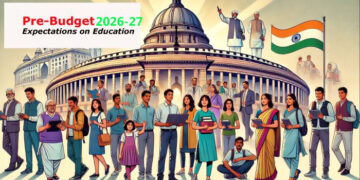Autar Nehru
Imagine this. A school puts up a publicity blitz and organizes a felicitation event with guests and parents to showcase one of its students who ranks very high in JEE. Then someone inquires the student about principal’s office and in a shocking revelation the innocent student says ‘I don’t know.’
This real incident explains a widely practiced phenomenon of dummy schools in several parts of India where students instead of schools attend coaching centres but are marked as regular students at a school. While the nexus between the thriving coaching industry and unscrupulous school owners was known for a long time, but in recent years particularly after the Covid pandemic, it has spread like never before. Purportedly the nexus of school owners and corrupt officials allows the students of these schools to write the board exams either as regular students or as private students without being detected.
The concept of dummy schools is not new and existed for years in some form, of late, according to sources, even reputed schools are giving in to parental pressure and allowing students to go to coaching while managing their school attendance under a money sharing arrangement with coaching centres. As more and more schools began to see emptying of their classrooms, there has been a hue and cry from schools across the country as these dummy schools have become normalized and are silently emptying schools in all major cities. If the students are not going to coaching centre, then the coaching centre is brought within school premises itself. Therefore, for the past two years, there have been a lot of pressure from schools on government agencies to convince them on action against these schools.
According to people aware of the thriving dummy school business, if it was the JEE/NEET coaching mafia which poached upon gullible parents and set the trend, now it is the policy environment that has taken away the primacy of class 12 board examination and therefore the need of compulsorily attending schools by the students. With the inception of Common University Entrance Test (CUET) in 2022 which doesn’t give any weightage to class 12 examination performance other than recognizing it as the qualifying exam, the value of school education is fast disappearing with ‘disastrous’ consequences evident from poor research culture in Indian higher education. Many top-ranking students in higher education institutions privately admit having skipped schools for dummy schools and having studied at coaching centres.
In 2024, the Government finally took note of this proliferating practice of dummy schools that is silently killing school education and started some action. On March 22, the national school board the Central Board of Secondary Education (CBSE) published a list of 20 schools that it found as dummy schools from across 12 states (Assam, Delhi, J & K, Chhattisgarh, Punjab, Delhi, Rajasthan, Madhya Pradesh, Maharashtra, Kerala, UP, and Uttarakhand) and disaffiliated them. Another three were downgraded. Inspections found these schools were committing various malpractices of presenting dummy students, faking attendance, enrolling ineligible candidates and not maintaining records properly as per the provisions and norms contained in Affiliation and Examination Bye-laws.
Then, on November 6, CBSE for a second time this year made a list of 27 schools (predominantly from Delhi north and west suburbs) public in this drive. Affiliation was withdrawn to 21 such schools while downgrading another six from senior secondary (10+2) to secondary (grade 10) after a series of surprise inspections in the month of September.
“The practice of dummy or non-attending admissions contradicts the core mission of school education, compromising students’ foundational growth. We are taking decisive action to combat the proliferation of dummy schools and to send a clear message to all affiliated institutions to resist the lure of accepting dummy or non-attending admissions,” CBSE Secretary Himanshu Gupta told at a presser while sharing the list of these schools.
The destruction of school education by dummy schools as feared by hundreds of school leaders must be a national concern. Covid pandemic leading to longest school closures of over 18 months in India triggered syllabus reduction (though it is back to pre-covid level now) by NCERT while the difficulty level of entrance examinations stayed intact, forcing many a parent to seek online and offline tuitions and coaching. The lingering effects of this switch over has influenced both the student behavior and parental choice and therefore given coaching industry more oxygen in the recent years. Again, the presence of unregulated agents and businesses promising help in passing board exams and economics of paying school fees versus getting tutored at the same price are adding its own dynamics to this problem. Many schools have quietly tied up with coaching centres or simply given space to them to function from the school itself.
“Dummy schools pose a threat to the very existence of holistic learning including co-curriculars and applied knowledge acquired through practicals—all of which is possible only by students educating at functional school campuses. The concept of coaching unfortunately has got so much acceptance among parents, who prioritize it over other thing that today practically even the most reputed schools are one way or the other affected by it. The problem is almost of epidemic proportion and unless it is addressed systemically, school inspections won’t do much to address this killer of education,” says Dr Sudha Acharya, principal ITL Public School, Dwarka (Delhi) and a former president of National Progressive Schools’ Conference. Dr Acharya, part of CBSE’s inspection team to a few of the de-affiliated schools (as said above) confirmed that raided schools lacked everything from students to classrooms and amenities. “You could make a school having enrolled 500 students didn’t have provisions for even a 100.”
Kota in Rajasthan, the coaching capital of north India often in news for suicides by stressed students, where about one lakh students arrive every year in more than 100 coaching institutes, is another dummy school promotion machine. The modus operandi of enticing parents with showcasing a few rank holders and big advertisements has resulted in students of even class 9 bunking schools for coaching here. According to Dilip Modi, promoter-chairman of the Jhunjhunu (Rajasthan)-based JIVEM Education Pvt. Ltd and vice-president NISA (National Independent School Alliance) Rajasthan, schools are the victims of the nexus of coaching and dummy school which is thriving because of the static view taken by the Government. “The Government of India issued guidelines (in 2023) for coaching centres but if it indulged a little and passed these very guidelines as regulations, things would have changed dramatically on ground and restored respect for schools,” he reasons.
The National Education Policy (NEP) 2020’s recommendation of making board exams easier is also being exploited to reduced the difficulty level of these exams with corresponding effect on lack of interest among both students as well teachers as the school education standards are not registering any uptick in surveys like NAS. Most of the southern states have quietly integrated coaching to schooling and made board exams mere formality. All this is further diluting the quality of schooling and diminishing value of school boards. So, it is time to decide on future of schools, which calls for a serious introspection and course correction on an urgent basis by the stakeholders.
Meanwhile Education Minster Dharmendra Pradhan has called for a social movement to ostracize dummy schools and asked private schools to improve their standards so that students don’t feel need to look for outside tutoring. He has also promised action on dummy schools. So, let’s keep a future date with this developing story as coaching is still a necessary evil for many.













